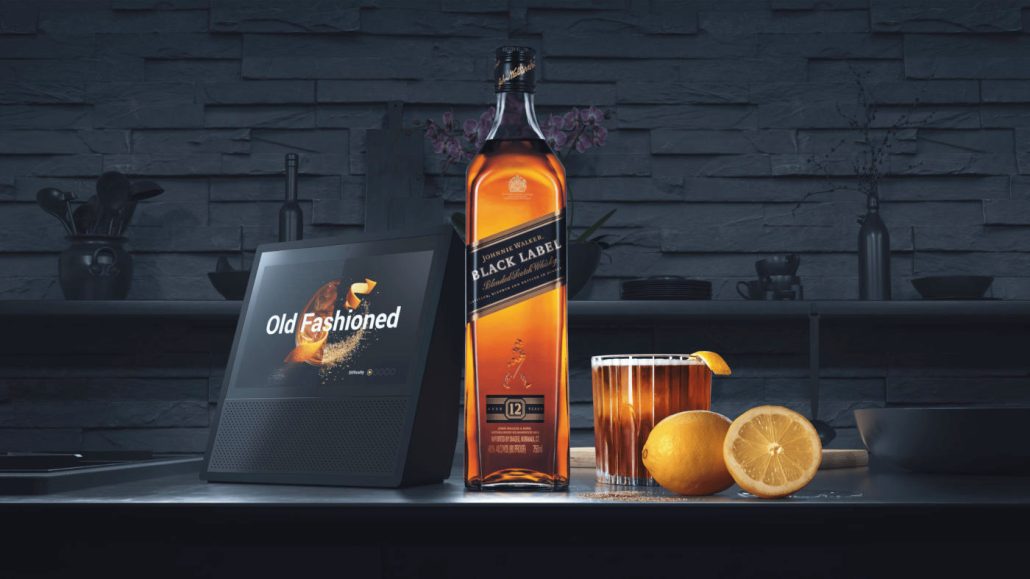
Diageo’s voice strategy is becoming clearer with the launch of a service for the Amazon Echo Show that shows people how to make cocktails with the drink maker’s brands.
It is the company’s first app in Europe for Amazon’s latest voice-controlled speaker, which launched last month with support from a handful of brands and publishers. Diageo was among the early adopters, intrigued by the addition of a screen to Amazon’s range of smart speakers, a feature Diageo believes makes the device perfect for the kitchen.
Rather than adapt an existing skill, the name for apps on Amazon’s voice-controlled devices, Diageo has created a new one for the Echo Show. The advertiser took the concept behind thebar.com, a site it launched in 2013 to tap into the trend of mixing drinks at home, and built a voice-controlled version called “The Bar.” The skill gives people three options: People can ask for a recipe and then be talked through the recipe; it offers cocktail suggestions based on user preferences such as sweet or sour; and it teaches people mixology techniques.
Ingredients for the cocktails can be saved to shopping lists that are then sent to the Alexa mobile app, where the user can buy the ingredients. The skill also gives users the option to purchase certain ingredients and 12 of Diageo’s brands, including Smirnoff, Captain Morgan and Johnnie Walker, by directing them to Amazon.
“Technology is changing the way we socialize in and outside of the home,” said Periklies Antoniou, new technology and media innovation manager at Diageo. “With the new The Bar skill, we’re tapping into the growing number of adults using voice-enabled devices to take them on a journey toward mastering mixology.”
Antoniou’s enthusiasm for the new skill reflects how quickly and aggressively Amazon has flooded the market with its range of smart speakers. Forty percent of U.K. households will own an Echo by next year, according to the Radiocentre. Wise to the possibilities that scale could bring, Diageo has cozied up to the online behemoth’s voice-controlled offering, so much that the advertiser was wheeled out during Amazon’s first upfronts to the U.K. advertising industry earlier this year.
Should the Echo device become ubiquitous in households, then it could potentially become a sales channel for Diageo, which has struggled with direct selling for years like most consumer goods companies. While Diageo’s latest Echo skill is focused more on brand awareness than e-commerce, the brand has previously talked up the latter’s potential on voice-controlled devices. A recent report in the U.K. from Accenture found that 60 percent of people want to use the Echo to help them shop, and 7 percent already do so.
Search will be fundamental to any full-fledged strategy Diageo concocts for voice-controlled devices.
There will come a time when many search queries won’t be “mai tai” in text form; instead, it will be “how to make a mai tai” as a verbal query, the company’s head of digital innovation, Benjamin Lickfett, has said. When that time comes, brands that exploit the most relevant conversational, long-tail search terms will be able to monetize voice searches, which is why Diageo is trying to have a plan in place before its rival brands.
Image courtesy of Diageo
More in Media

In Graphic Detail: The scale of the challenge facing publishers, politicians eager to damage Google’s adland dominance
Last year was a blowout ad revenue year for Google, despite challenges from several quarters.

Why Walmart is basically a tech company now
The retail giant joined the Nasdaq exchange, also home to technology companies like Amazon, in December.

The Athletic invests in live blogs, video to insulate sports coverage from AI scraping
As the Super Bowl and Winter Olympics collide, The Athletic is leaning into live blogs and video to keeps fans locked in, and AI bots at bay.








